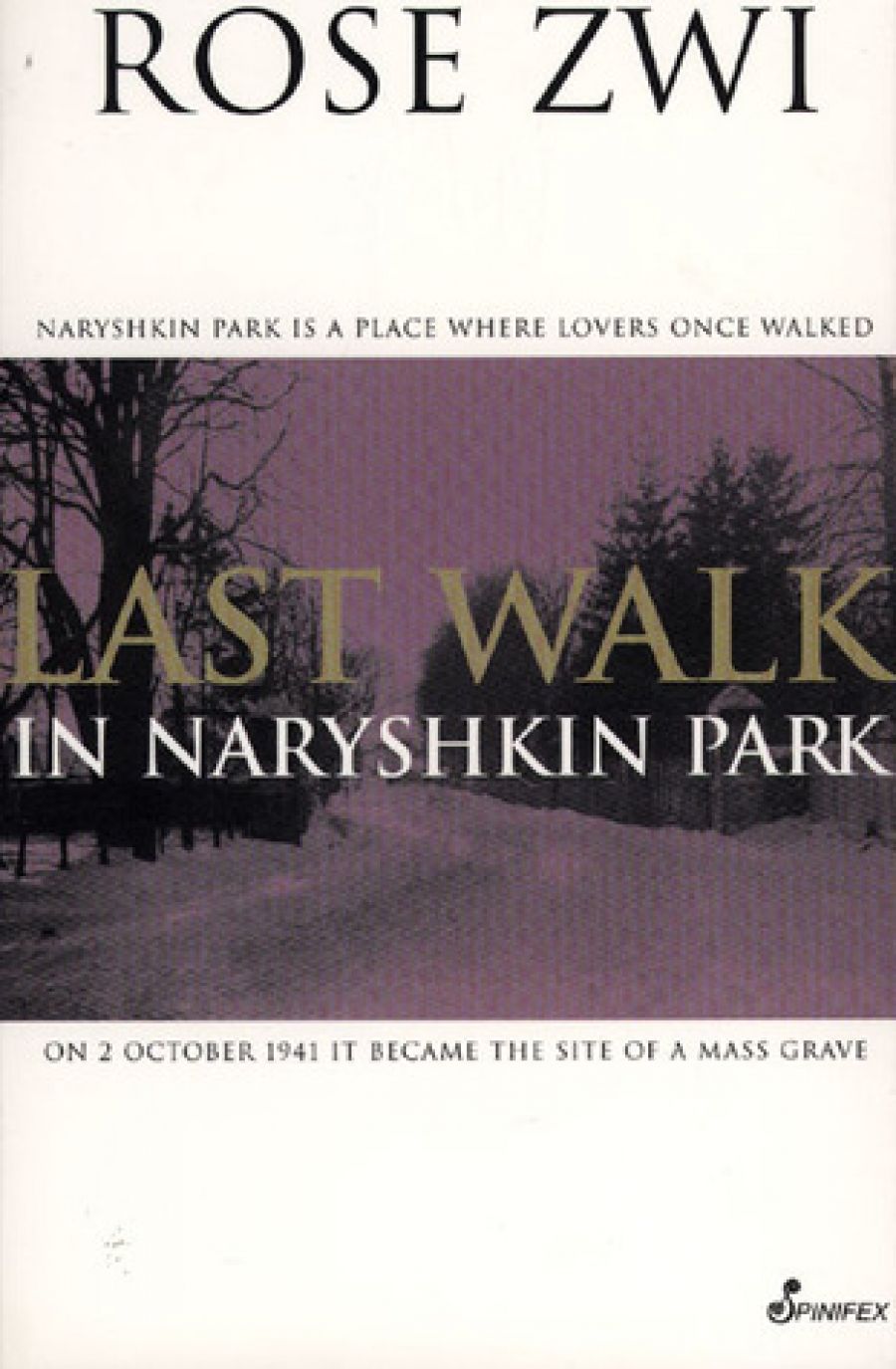
- Free Article: No
- Contents Category: History
- Review Article: Yes
- Article Title: Witnessing
- Online Only: No
- Custom Highlight Text:
Holocaust denial comes in many guises. One is the comfortable belief that European nationals were ignorant of the slaughter of their fellow Jewish citizens, and would have been appalled had they known. Daniel Goldhagen’s Willing Executioners: Ordinary Germans and the Holocaust has been the most controversial challenge to this so far, but it is not alone. Abraham Biderman, survivor of Auschwitz, Buchenwald and Bergen-Belsen, whose memoir The World of My Past had difficulty finding a publisher here but went on to win awards, is reluctant to exaggerate about the Poles. Nevertheless he writes, ‘With hindsight, however, it seems to me that the majority of them were happy to see the Jews destroyed.’
- Book 1 Title: Last Walk in Naryshkin Park
- Book 1 Biblio: Spinifex Press, $24.95 pb, 252 pp
Abraham Biderman is one of a host of survivors who have testified to the horrors they endured in the face of the minimisation, indifference and outright disavowal to which the Holocaust has been subjected. Zwi represents another class of witness: those whose immediate family escaped, but who lost grandparents, uncles, aunts, nieces, and cousins, and upon whom the mantle of reconstruction has fallen. As with Theo Richmond in his magnificent Konin, and many others in this predicament, it was a mantle that Zwi donned reluctantly. Heir to her parents’ guilt for leaving others behind, she had tried to assuage it by joining movements to right other wrongs, but eventually this central one caught up with her. It’s a familiar story among Jews, and was easy enough for Zwi, who grew up in apartheid’s South Africa.
Her book is part history, part personal memoir, the story of her search to discover what happened to her uncle Leib, who never forgave his older brother Gershon for leaving, and about whom her father suffered torments of guilt. In 1926 a coup established an ultra-nationalist government; Gershon and his new wife Sheva left Lithuania for Mexico, then, after experiencing anti-Semitism there, they went to South Africa. After emigrating Gershon received only one communication from Leib, in which he was bitterly censured; a second, written in 1943 as Leib lay dying from war wounds, never reached him.
In 1992 Zwi went to Zhager, a visit she prepared for by research in South Africa, New York and Israel, hunting through records, speaking to survivors. Hers, quite literally, was a journey through the past, and each step she took dredged up details, facts and memories which would reconstruct the town as it was in the 1930s, and the vibrant Jewish culture that flourished there. She also acquired other, less palatable remembrances. A week before the German invasion, the Soviets had deported some of Zhager’s Jews to Siberia. When the Germans arrived those who were left were rounded up and taken to the town square. There the rabbi was stripped and harnessed to a cart, while ‘all our gentile friends and neighbours’ stood watching and laughing.
If you were an intellectual or had two kopekes to rub together, the Bolsheviks condemned you as a capitalist. The Nazis and their Lithuanian henchmen, on the other hand, killed Jews for being Bolsheviks.
The children who were supposed to be saved by Lithuanians were sent to a military hospital, where they were killed and drained of their blood. The others were taken to Naryshkin Park and murdered.
All told, 95 percent of Jewish Lithuanians were slain. When Zwi arrived in Zhager it was all but judenrein. One Jew, married to a gentile, was all that remained. Naryshkin Park was bare, most of the trees were gone. In the centre was the Jewish grave.
Jewry had a long and rich history in Lithuania, beginning in the seventeenth century. Yet a generation of Lithuanians has grown up with a totally cockeyed view of the role Jews played there, with no idea of their immense contribution to the country.
Where they appear at all in history books or in learned articles, Jews are portrayed as a troublesome minority, alien to the native population, a disloyal element which allied itself with the Soviet regime that oppressed the Lithuanian people.
On a second visit Zwi found more to disturb her. The Lithuanian government was discouraging any reference to what happened to Lithuania’s Jews during the war. Former Nazi collaborators were being rehabilitated. A German film about the return of a Jewish survivor to her birthplace was reviewed in a Lithuanian paper; the film was condemned as slander. Yet there were other, more hopeful indications that at least some Lithuanians were willing to acknowledge their past. At the entrance to Naryshkin Park was a new sign, marking the site as ‘the grave of Jewish victims of genocide’.
The moving, final passage of the book relates an encounter Zwi had with a local historian, a woman who, despite the thoroughness with which she could speak about the Naryshkins, the aristocrats who had once owned the park, was completely misinformed about the history of the Jews in the area and the contribution they made to it for four hundred years-until Zwi herself confronted her with documents. Then the truth could no longer be suppressed. ‘We must never forget it!’ the historian suddenly cried. ‘The women and children were beaten up and thrown onto lorries. The streets ran with blood. I’ll never forget it,’ she cried. But she, an historian, had never taken the trouble to record it.


Comments powered by CComment